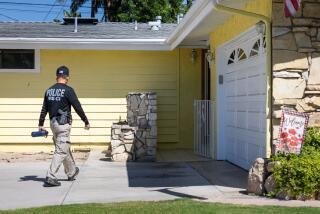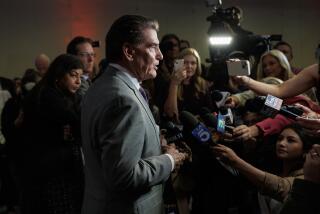FBI Probing Report of Payment Scheme at S
FBI agents are questioning former officers and employees of Irvine-based Lincoln Savings & Loan to determine if top executives were paid excessively high salaries with the understanding they would contribute some of that money to political candidates, sources familiar with the federal investigation said.
The inquiries involve a larger number and broader group of people than previously reported, the sources said. It was reported earlier this week that the FBI has quizzed state and federal regulators about their knowledge of any scheme to funnel corporate assets to political campaigns.
Creditors who lost millions of dollars in the April collapse of Lincoln and bankruptcy of its parent firm, American Continental Corp. in Phoenix, have claimed in lawsuits that political donations helped American Continental Chairman Charles H. Keating Jr. wield influence over regulators and keep the S&L; alive about two years beyond the point it should have been seized.
“There’s no question there’s an extensive investigation going on,” said Bradley J. Boland, an American Continental spokesman. “At least 30 people we know of have been interviewed by the FBI. But they all told us that they said their contributions were purely voluntary and that they were not reimbursed at all.”
Campaign contributions are expected to be one of the topics at a hearing today before the House Banking Committee, which is investigating what could become the costliest failure in thrift history. Taxpayers are likely to pay $1.1 billion to $2 billion to repair the damage.
An American Continental spokesman vehemently denied that executives were paid high salaries for the purpose of financing political contributions and circumventing campaign laws that limit contributions to $1,000 per person.
He also denied there was pressure on any employee to contribute money to politicians, though Keating encouraged them to support the candidates of their choice.
Keating and about 75 family members, employees and business associates contributed more than $700,000 in campaign contributions to 37 politicians. More than $300,000 of that went to Sen. Alan Cranston (D-Calif.) and four other U.S. senators, all of whom intervened with federal regulators on behalf of Lincoln.
In addition, Cranston solicited $850,000 from Keating for three voter registration groups, including one headed by Cranston’s son, Kim.
One of the witnesses expected to testify today before the Banking Committee had been quoted in a newspaper report earlier this week as saying Lincoln laundered campaign funds illegally. But the witness, William J. Crawford, commissioner of the state Department of Savings and Loan, said he was misquoted.
Crawford also said an FBI document referring to his conversation with a Lincoln executive contained substantial errors. “I don’t know that there was any order to pay anything to anyone, and no absolute suggestion that executives had to make contributions,” he said.
Crawford said that if asked, he would explain to the Banking Committee what he knows about employee contributions to political campaigns.
Employees and executives interviewed shortly after Lincoln’s collapse said then that they were never pressured into making contributions, though they sometimes arrived at work to find solicitations from political or religious groups on their desks.
“We can categorically deny that people were paid in order to make campaign contributions,” the American Continental spokesman said. “They were not reimbursed and not forced to do it. Any campaign contributions made by employees was made absolutely voluntarily.”
More to Read
Inside the business of entertainment
The Wide Shot brings you news, analysis and insights on everything from streaming wars to production — and what it all means for the future.
You may occasionally receive promotional content from the Los Angeles Times.










